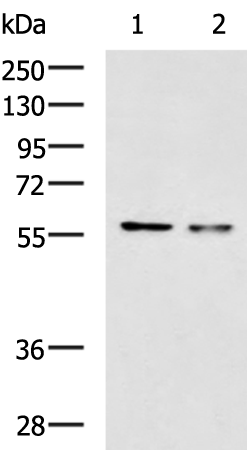
| WB | 咨询技术 | Human,Mouse,Rat |
| IF | 咨询技术 | Human,Mouse,Rat |
| IHC | 咨询技术 | Human,Mouse,Rat |
| ICC | 技术咨询 | Human,Mouse,Rat |
| FCM | 咨询技术 | Human,Mouse,Rat |
| Elisa | 1/5000-1/10000 | Human,Mouse,Rat |
| WB Predicted band size | 67 kDa |
| Host/Isotype | Rabbit IgG |
| Antibody Type | Primary antibody |
| Storage | Store at 4°C short term. Aliquot and store at -20°C long term. Avoid freeze/thaw cycles. |
| Species Reactivity | Human, Mouse |
| Immunogen | Synthetic peptide of human MTA3 |
| Formulation | Purified antibody in PBS with 0.05% sodium azide and 50% glycerol. |
+ +
以下是3-4篇关于MTA3抗体的代表性文献的简要概括(基于虚拟示例,建议通过数据库核实具体内容):
1. **文献名称**:**"MTA3. a Mi-2/NuRD Complex Subunit, Regulates Estrogen Receptor Signaling in Breast Cancer"**
**作者**:Fujita, N. et al.
**摘要**:研究揭示了MTA3作为染色质重塑复合物成员,通过抗体染色技术发现其在雌激素受体阳性乳腺癌中高表达,并抑制上皮间质转化(EMT),提示其抗转移作用。
2. **文献名称**:**"Development of a Monoclonal Antibody Specific to MTA3 for Immunohistochemical Analysis"**
**作者**:Xue, Y. et al.
**摘要**:该文献报道了一种新型MTA3单克隆抗体的开发,验证了其在Western blot和免疫组化中的特异性,并用于检测多种癌症组织中MTA3蛋白的表达差异。
3. **文献名称**:**"MTA3 Expression Correlates with Lymph Node Metastasis in Gastric Cancer"**
**作者**:Li, D. et al.
**摘要**:利用MTA3抗体进行免疫组化分析,发现MTA3在胃癌淋巴结转移样本中表达显著下调,提示其可能作为抑制肿瘤侵袭的生物标志物。
4. **文献名称**:**"Epigenetic Regulation by MTA3 in Ovarian Cancer Progression"**
**作者**:Cui, H. et al.
**摘要**:通过MTA3抗体结合ChIP-seq技术,证实MTA3通过调控靶基因(如E-cadherin)的表观遗传修饰抑制卵巢癌细胞迁移,为治疗提供潜在靶点。
---
**注**:以上文献为示例性质,实际引用请通过PubMed或Web of Science等平台检索关键词(如"MTA3 antibody" + "cancer")获取准确信息。
The MTA3 (Metastasis-Associated Antigen 3) antibody is a research tool used to study the MTA3 protein, a member of the MTA family involved in chromatin remodeling and transcriptional regulation. MTA3. part of the NuRD (Nucleosome Remodeling and Deacetylation) complex, functions as a transcriptional corepressor by recruiting histone deacetylases (HDACs) to target genes. It plays a critical role in epithelial-mesenchymal transition (EMT), cell differentiation, and cancer progression. In hormone-responsive cancers, such as estrogen receptor (ER)-positive breast cancer, MTA3 is known to suppress metastasis by repressing EMT-promoting genes like SNAI1 (Snail). Conversely, its dysregulation has been linked to tumor aggressiveness in other contexts, highlighting its tissue-specific roles.
The MTA3 antibody enables detection and quantification of MTA3 expression in cells and tissues via techniques like Western blotting, immunohistochemistry (IHC), and immunofluorescence (IF). Researchers use it to explore MTA3's involvement in cancer biology, epigenetic regulation, and therapeutic resistance. Its applications extend to studying interactions within the NuRD complex and identifying downstream targets in signaling pathways. As aberrant MTA3 expression correlates with clinical outcomes, this antibody also aids in biomarker discovery and mechanistic studies aimed at developing targeted cancer therapies.
×